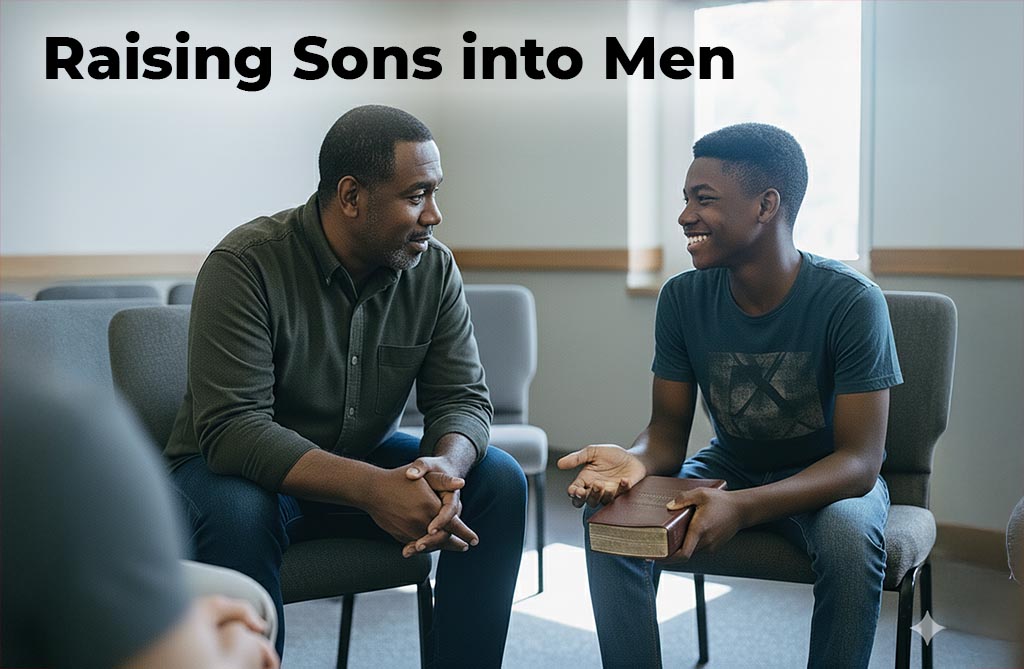
Big idea: A church-based rite of passage.
Texts: Proverbs 1-9; 1 Corinthians 13:11.
Hook: Ceremony outline plus a one year mentorship track.
There is a moment when a boy needs to know he is becoming a man. In our culture, outside of the Jewish ceremony of Bar Mitzvah, that moment is completely blurry. Most young men drift from childhood into their twenties with no clarity on what it means to take responsibility, to lead with courage, and to walk in wisdom.
Scripture paints a far better picture. Now, granted there is no specific prescribed ritual in the Christian faith, but we can see teachings that would encourage maturing spiritually as a boy gets older. Proverbs chapters 1-9 shows a father and mother passing wisdom to a son, urging him to pursue righteousness, reject folly, and cling to the fear of the Lord. Paul admits in 1 Corinthians 13:11 that there was a time to speak, think, and reason like a child, but manhood meant putting away childish ways. We need that same clear dividing line in the church today.
Why a rite of passage matters
Every culture has rituals that mark a boy’s transition into adulthood. The problem is that most of ours, especially in the United States and Canada, are shallow or destructive. The first drink, the first car, the first sexual conquest, or the first paycheck get treated as markers of manhood. None of them hold weight in God’s eyes. A church based rite of passage reclaims the biblical truth that true manhood is about wisdom, responsibility, and Christlike maturity. Boys need more than vague encouragement; they need a community of men saying, “Here is what it means to be a man of God. We will walk with you.”
When the church takes this seriously, fathers and mentors help sons understand that manhood is not about dominance but about self control, service, sacrifice, and leading with humility. The result is not only stronger young men but stronger families and healthier churches.
The outline of a rite of passage ceremony
Picture this: a group of fathers, mentors, and church leaders gather with a small circle of boys on the cusp of adolescence. There is prayer, there is Scripture, and there are challenges spoken. Each young man is charged from Proverbs with the call to seek wisdom and fear the Lord. Each is reminded from Paul that childish things must be put away.
The ceremony does not need to be elaborate. What matters is clarity. Present the young men with a tangible symbol, perhaps a Bible with their name engraved, or a letter from their father. Allow the gathered men to lay hands on them, to pray for courage, purity, and faithfulness. Let them hear the words, “We receive you as a young man, and we will walk with you.”
The one year mentorship track
A ceremony is powerful, but it is not enough. It must lead into a season of intentional mentoring that forms character and deepens faith. A rite of passage without a follow up is just a moment. A mentorship track turns it into a movement. The goal is not to make the year complicated or burdensome, but to build steady habits of growth in each young man.
1. Structure and commitment
- Each boy is paired with a godly mentor – ideally a man from the church who demonstrates faith, consistency, and humility.
- They commit to meeting monthly for one year, with optional check ins between sessions for prayer or encouragement.
- The mentor keeps brief notes on each session to track growth and identify areas for further discipleship.
2. Monthly meeting rhythm
Meetings should be simple and consistent – usually lasting about an hour. Each session can include three core elements:
- Scripture and discussion. Read and discuss a short passage together, focusing on wisdom, purity, work, and leadership. Proverbs and the Gospels make excellent starting points.
- Life check in. Talk about challenges at home, school, or work. Ask open questions: “What have you struggled with this week?” “How can I pray for you?”
- Action step. End each meeting with a practical assignment – a Scripture passage or set of verses to memorize, a person or specific ministry to serve, or a goal to pursue before the next session.
3. Core mentorship topics
Each month can highlight one key biblical principle of manhood:
- Month 1: What it means to fear the Lord (Proverbs 1:7).
- Month 2: Integrity and honesty.
- Month 3: Work, diligence, and responsibility.
- Month 4: Purity and self control.
- Month 5: Servant leadership – leading through humility.
- Month 6: The Gospel of Jesus Christ, evangelism, and the importance of discipleship
- Month 7: Financial stewardship and generosity.
- Month 8: Spiritual disciplines – prayer and the Word.
- Month 9: Dealing with failure, guilt, and repentance.
- Month 10: Protecting and honoring women.
- Month 11: The local church and community service.
- Month 12: Review, testimony, and celebration of growth.
4. Shared service and accountability
- Mentors should involve young men in real life ministry: ushering, yard work, hospital visits, or helping with sound, media, or children’s programs.
- Every few months, host a small group night for all mentors and mentees to share stories, pray together, and encourage one another.
- At the end of the year, have each young man write a short testimony about what he learned and how he grew in his faith.
5. The final gathering
At the end of the twelve months, gather the group again – the same mentors, fathers, and young men. Let the boys share what they have learned, and allow the mentors to speak words of blessing over them. Present each one with a small token – a study Bible, a simple cross, or a handwritten letter of affirmation. The goal is to affirm that manhood is not about independence, but about responsibility under Christ.
Bringing it home
I can tell you from experience that young men long for this kind of clarity. They may act uninterested, but deep down they are looking for someone to tell them what it means to stand tall, to take ownership, and to follow Christ with strength. When the church provides a clear path, boys see that becoming a man is not about earning respect through rebellion, but about gaining honor through obedience to God.
This next month, gather a handful of dads and leaders in your church. Sketch out a plan for a simple ceremony. Start identifying mentors who will invest a year into these young men. Build the track as you walk it. Do not worry about making it polished; focus on making it biblical and relational.
Hidden faithfulness will grow boys into men. And men into leaders. And leaders into examples for the next generation.

0 Comments